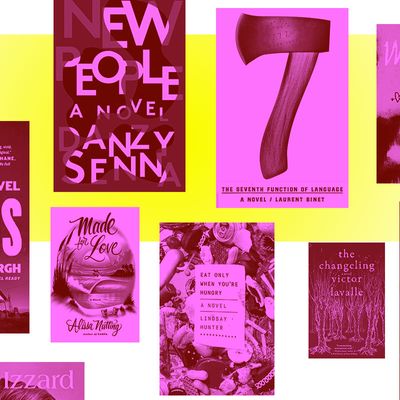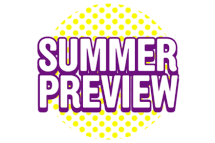

New season, new reading list. Whether you’ll be spending the next three months lounging on the beach or soaking up air-conditioning on the couch (or let’s be real, squeezing between sweaty commuters on the subway) we’ve got the right book for you. Straight ahead, the ten best books to read this summer.
White Fur by Jardine Libaire (Hogarth, May 30)
Here’s a sexy, literary love story that just might signify that the age of the BDSM billionaire as romantic hero is over. White Fur is a novel about a young man and woman — one rich, one poor — who fall in love in New York City in the 1980s. If the plot sounds familiar, then it’s the writing that makes engaging with the novel such a sensual experience. White Fur would merely be an excellent exploration of the power dynamic between two lovers if the prose wasn’t so evocative and the sex scenes so torrid. —Maris Kreizman
The Ministry of Utmost Happiness by Arundhati Roy (Knopf, June 6)
It’s finally here! Fans of The God of Small Things have been waiting 20 years for Arundhati Roy’s next novel, and it doesn’t disappoint. The Ministry of Utmost Happiness is big, both in physical heft and in lofty ideas. It features an unforgettable cast of characters from across India whose stories are told with generosity, compassion, and a hefty dose of magical realism. The novel’s greatest feat is showing the ways in which religious belief, gender identity, and even our safety in the world, are not fixed — they have as much fluidity as Roy’s astute plotting. —Maris Kreizman
Kingdom Cons, by Yuri Herrera (And Other Stories, June 13)
The hotly anticipated third translation in what the author has called “a trilogy that was created afterwards,” Kingdom Cons presents a stand-alone story line, yet it assumes the same allegorical, otherworldly aura that entranced readers of Herrera’s previous works, Signs Preceding the End of the World and The Transmigration of Bodies. In a court where the power of a king is unquestioned, the new and subversive work of a popular artist threatens the ruling order. Slim and seductive, infused with the border-land, narco-world suspense that has marked Herrera as one of Mexico’s finest novelists, it promises to be a sizzling summer read. —Miles Klee
Believe Me by Eddie Izzard (Blue Rider Press, June 13)
Beloved British comedian Eddie Izzard has been making audiences laugh since the early ’90s, back when his enjoyment of dressing up in women’s clothes to tell elaborate, surreal comedy stories seemed risqué. Written with the same wit and candor that characterizes his stand-up, Izzard’s memoir tackles his sexuality, his troubled childhood, and the tumultuous early days of his career, even as he recounts his many excellent roles, albums, and tours. Hot tip: Izzard narrates the audiobook version of his memoir, so this might be a perfect one to save for your headphones. —Maris Kreizman
The Changeling, by Victor LaValle (Spiegel & Grau, June 13)
Fans of the macabre can’t miss the latest offering from prolific horror master Victor LaValle, which hurls us into the most harrowing abyss imaginable: parenthood. Apollo Kagwa, abandoned by his father in childhood and left with nothing but nightmares and a mysterious box of bizarre books, finds himself lost years later as he and his wife Emma welcome a new child into their lives. Something is definitely wrong with Emma and their boy, but Apollo will have to embark on a reality-bending journey through fairy-tale graveyards and forests to understand the problem. Definitely scarier than anything you’ll hear around the campfire. —Miles Klee
Made for Love, by Alissa Nutting (Ecco, July 4)
Alissa Nutting’s debut novel Tampa was a chilling tour through the steely mind of a high-school teacher bent on seducing teenage boys, often likened to a gender-flipped Lolita. Her follow-up is no less ambitious. Our narrator, Hazel, has fled her suffocating marriage to a Silicon Valley villain with the lawsuit-avoidant name Bryan Gogol, CEO of Gogol Industries. It’s bad enough he’s cyberstalking her with all the bleeding-edge tech at his disposal, but when he demands to meld minds with Hazel via brain-embedded microchips, she has to escape his clutches once again — this time into lurid back country she barely recognizes. —Miles Klee
The Seventh Function of Language, by Laurent Binet (FSG, August 1)
Another translation — this one from France — The Seventh Function of Language should delight anyone who reveled in their college lit classes. The story begins with Roland Barthes, the towering literary theorist who wrote “The Death of the Author” and was fatally struck down by a laundry van in Paris in 1980. Binet uses this “absurd” incident to interrogate history itself, as he did with his World War II book HHhH, asking, what if Barthes was actually murdered? The result is a deconstructed police procedural with suspects including Michel Foucault, Umberto Eco, and Judith Butler. Think The Da Vinci Code, but better. —Miles Klee
New People by Danzy Senna (Riverhead, August 1)
Maria is a doctoral student struggling to finish her dissertation on the music of the Jonestown massacre, while also grappling with finding her own place in 1990s Manhattan. Her adoptive mother once said she possessed “the particular rage of the light-skinned individual”— she seemingly belongs everywhere and nowhere, to every ethnic group and none at all. Danzy Senna’s latest stunner of a novel is both political and bingeable, worthy of a one-sitting read, especially when Maria strays from her perfect fiancé to keep tabs on a very intriguing poet. —Maris Kreizman
The Blinds by Adam Sternbergh (Ecco, August 1)
Edgar Award nominee (and New York editor) Adam Sternbergh is back with his most ambitious novel yet — a work of speculative fiction set in a sparsely populated, off-the-grid Texas town where former criminals (or witnesses to crimes) go to live after the memories of their pasts are erased. In the Blinds, these exiles pick new names (combining the first name of an old movie star with the last name of a vice-president) and try to make new lives for themselves. Suffice it to say, all does not go according to plan in this experiment, which seems doomed from the start. But the setting gives Sternbergh a perfect venue to play with story and form, making The Blinds a thrilling Western unlike any you’ve ready before. —Maris Kreizman
Eat Only When You’re Hungry, by Lindsay Hunter (FSG, August 8)
Lindsay Hunter threw a devastating one-two punch with Don’t Kiss Me (a collection of jagged, gritty character sketches) and Ugly Girls (a novel of desperate childhood friendship that gives way to a darker menace). She comes roaring back with Eat Only When You’re Hungry, the odyssey of Greg, an overweight, middle-aged dad who’s searching the seediest corners of Florida for his missing addict son, Greg Junior. The journey will test his already fractured self-image, resurrect a legacy of familial failure, and dissolve the accepted distinction between shooting up and eating oneself to death. Save this one for your big road trip. —Miles Klee

